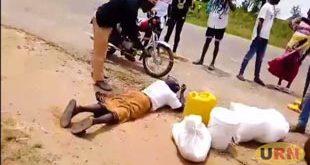
Protests to increase if economy, security brutality worsen
Museveni’s bid to lift the presidential age-limit, the bad and worsening economy, land grabbing, poverty-driven insecurity, and growing elite impunity of those close to power and brutality of the security forces, especially the police are some of the issues most pundits that The Independent spoke to predict will dominate 2017.
Many cite the high profile shootings seen at the end of 2016 like that of Maj. Sulaiman Kiggundu, and that of Kenneth Akena, which involved the Kanyamunyu brothers, and the December late night security raid on the Nakasero Mosque in Kampala.
All these will play out against the dominant theme of Museveni’s struggle to cling on to power, not by seeking more popularity but by clipping the growth of alternative centres of power; especially politicians and traditional leaders.
“I don’t foresee a stable and peaceful year because of all these issues either remain unresolved or are met with brutality from security operatives,” says Livingstone Ssewanyana, the executive director of the Foundation for Human Rights Initiative (FHRI), “Museveni will still resort to excessive force to stay in charge.”
Ssewanyana says the political instability and political intolerance seen since the February 18, 2016 elections is only increasing and there is not hope that things will get better in the short run.
“The harassment of the opposition and the killings in Kasese for example demonstrate the growing dissent,” he says, “We are likely to see more conflicts in other parts of the country.”
He also adds that there is likely to be tension over the land issue because of the current land grabbing reports and how government is planning to hand the issue of compulsory land acquisition.
Government plans to amend Article 26 of the Constitution, which provides for prior payment of land before possession; fair, adequate and prompt compensation.
In the proposed amendment, where the parties are unable to agree on the fair and adequate compensation, the government shall deposit in court or with any other competent authority the value of the property as evaluated by the chief government valuer and take possession of the property pending determination by the court or other competent authority of the disputed amount of the compensation.
The amendment, which continues to stir debate, was first proposed by the ruling party’s parliamentary caucus and, on paper, is intended to prevent situations where land disputes end up delaying public projects. Opponents to it claim the amendment is legal cover for powerful individuals in the government to grab land with impunity.
 The Independent Uganda: You get the Truth we Pay the Price
The Independent Uganda: You get the Truth we Pay the Price


